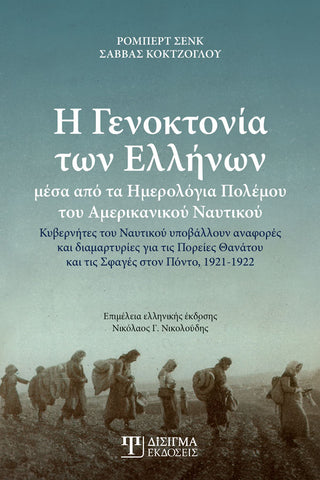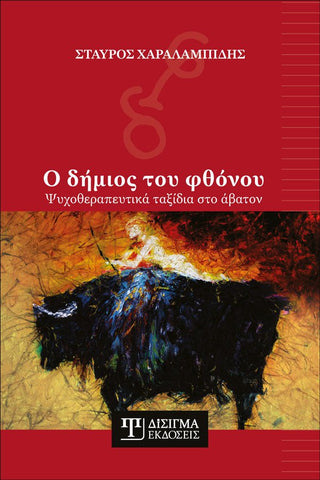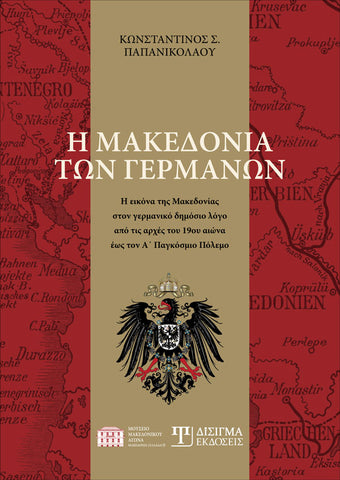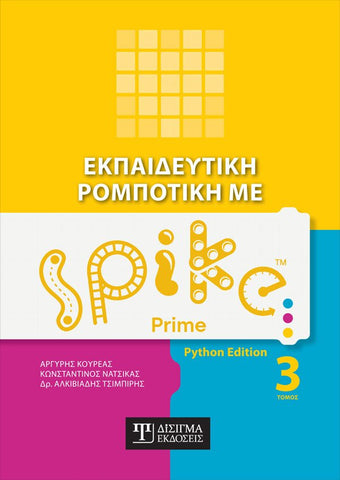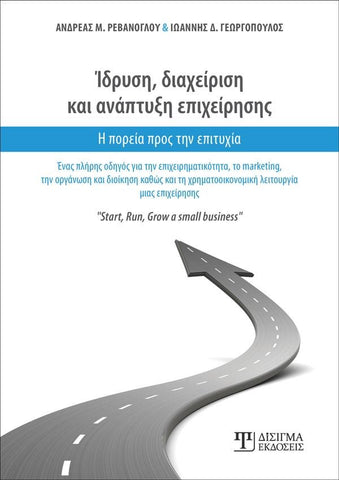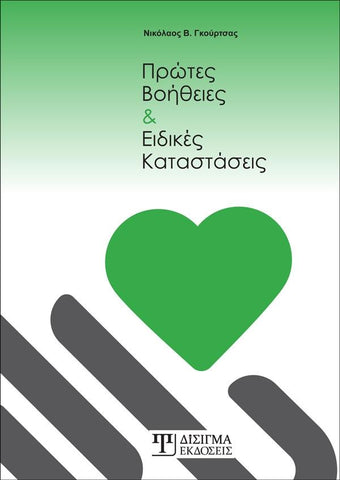
Academic English for Mathematics
Academic English for Mathematics
Το βιβλίο Ακαδημαϊκά Αγγλικά για Μαθηματικά (Academic English for Mathematics) είναι ειδικά σχεδιασμένο για φοιτητές που σχεδιάζουν να ξεκινήσουν ένα πανεπιστημιακό πρόγραμμα Μαθηματικών στο οποίο το μέσο διδασκαλίας είναι η αγγλική γλώσσα. Στόχος του βιβλίου είναι να αναπτύξει τις γνώσεις σας σχετικά με τους ακαδημαϊκούς και επιστημονικούς κανόνες και να βελτιώσει τις δεξιότητές σας στους ακόλουθους τομείς:
- την ανάγνωση και κατανόηση άρθρων Μαθηματικών
- την κατανόηση διαλέξεων Μαθηματικών και του τρόπου καταγραφής σημειώσεων των κυρίως θεμάτων
- τη συγγραφή για διαφορετικά ακροατήρια και σκοπούς μέσα στον ίδιο κλάδο
- την αποτελεσματική συμμετοχή σας σε ακαδημαϊκά σεμινάρια και συζητήσεις
- την προετοιμασία και σχεδιασμό αποτελεσματικών επιστημονικών παρουσιάσεων
- τη βελτίωση του ακαδημαϊκού λεξιλογίου και των εμφανών χαρακτηριστικών γραμματικής
- τη βελτίωση των ακαδημαϊκών δεξιοτήτων γραφής και των ακαδημαϊκών συμβάσεων
- τη βελτίωση των ακαδημαϊκών δεξιοτήτων μελέτης όπως ο προγραμματισμός και η λήψη σημειώσεων
- τη βελτίωση της κριτικής σας αντίληψης και έκφρασης
- τη βελτίωση ανεξάρτητων ερευνητικών πρακτικών
Book Review
1 Real Numbers
Themes
Properties of real numbers; whole numbers, natural numbers, integers, fractions,
rational numbers, square roots, irrational numbers
Vocabulary
Definitions of types of numbers; properties of real numbers, derivatives
Common procedures followed by mathematicians: factoring, using reciprocals/
division, collecting like items, using average, converting to decimal or fractional
notation
Writing
Paragraph structure, cohesion and coherence
Note-taking
Identifying main points in a lecture: “Imaginary and complex numbers” contents
2 Algebraic Expressions, Equations and Functions
Themes
Algebraic expressions, equations and functions
Discussion
Skimming and scanning, identifying main points
Vocabulary
Using a variety of words to describe arithmetic processes; translating “text” to algebra;
reading functions and equations
Note-taking
Linear style abbreviations and symbols
Style
Introducing formality by comparing two excerpts
3 Exponents and Exponential Functions
Themes
Exponents and exponential functions; exponential decay and growth; geometric
progressions and scientific notation
Academic vocabulary
Definitions;
Writing the product as a monomial in a standard form
Numbers of Science: Conversions from Metric system to English
Metric prefixes for powers of 10
Comparing objects of widely different sizes: orders of magnitude
Academic writing and style
Introduction to paraphrasing;
Expressing cause and effect as a paraphrasing tool
4 Introduction to Reasoning and Proof
Themes
The language of proofs regarding segments; inductive and deductive reasoning,
theorems, logic tables, axioms, methods of proof
Discussion
Useful phrases
Vocabulary
Definitions of Logic Theory terms
Writing
The language and symbols of proofs
Note-taking
Writing
Mathematical proofs by induction, identifying the base, hypothesis and conclusion
5 Introduction to Probability
Themes
Introduction to probability, random events, random variables and their categorisations,
density and distribution functions, notation and axiomatic definition of probability
Vocabulary
Definitions of probability related terms; collocations; notation in probability, adverbial
phrases
Academic style
Introduction to academic caution; modal verbs and the lack of tentative language in
Mathematics
Note-taking
Peer-reviewing notes on probability webinar
6 Introduction to Statistics
Themes
Data, sample population, numerical descriptors, rational equations and functions;
descriptive and inferential statistics, statistical significance; standard deviation,
coefficient of variation, mean, median; graphs
Vocabulary
Statistics: Definitions
Word formation and use-in-context
Language
The use of gerund and infinitive in Mathematics
Presentation/Writing
Reporting graphs and charts
Writing
Writing a report following a chart or graph
Plagiarism, citations and references; why and how we use them
7 Geometry connections
Themes
Introduction to Geometry; lines, points, planes and angles, parallel and perpendicular
lines
Discussion
Expressing agreement, disagreement or acknowledgement
Academic vocabulary
Use in context, definitions of popular mathematical terms
Geometric shapes: 2D and 3D definitions
Giving examples
Academic writing
Summary guidelines and practice
Note-taking
Identifying the moves in a lecture; using reference verbs
8 Properties of Triangles
Themes
Triangles; main and secondary elements of a triangle, types of triangles by lengths
of sides, classification according to internal angles, the Pythagorean Theorem, the
concepts of congruence and similarity
Vocabulary
Definitions; use-in-context: types of triangles
Writing a two-column proof
Making comparisons
Writing
Passive voice
Presentation
Opening/closing phrases and transitions
9 Introduction to Trigonometry
Themes
Right triangle Trigonometry, ratios, sine, cosine, tangent,
trigonometric identities, function graphs
Academic vocabulary
The language of theorems, axioms and proofs
Note-taking practice
The unit circle
Academic presentation skills
Signposting language that engages your audience enhances the impact of your speech
10 The Geometry of the Circle
Themes
Properties of circles; chords, tangents, secants, equations and graphs of circles
Vocabulary
Use-in-context; definitions
Geometry tools
Note-taking
Equations and graphs of circles
Writing
How to write an argumentative essay on “Pure vs. Applied Mathematics”
Using evaluative language to unfavour someone’s view
11 Polygons and Quadrilaterals
Themes
Polygons and quadrilaterals; parallelograms, rhombi, rectangles, squares,
kites and trapezoids
Ratios, proportions and similarity applied to polygons and quadrilaterals,
proportionality with parallel lines, dilations and fractions
Vocabulary
Definitions; use-in-context; adjective suffixes
Academic language focus
Subject verb agreement; quantifiers
Academic style
Avoiding wordiness and repetition
Academic presentation skills
From text to slides
Using visuals to enhance the impact of your presentation
Note-taking
Tessellations
12 The Geometry of Three Dimensions
Themes
Introduction to the geometry of three dimensions, points and lines in space, coordinate
systems, polyhedra and solids of revolution
Academic vocabulary
Definitions: use in context
Academic style
Formality and complexity;
Comparing texts written for different audiences
Introduction to critical reading
Common pitfalls when writing a scientific paper
Appendix
Glossary
Evaluation criteria
Transcripts
Bibliography
Downloads
| File Type | File Name |
|---|---|

|
Περιεχόμενα |

|
Ενδεικτικό Κεφάλαιο |
| Συγγραφέας | Βιογραφικό |
|---|---|

|
Η Κάλλια Κατσαμποξάκη-Hodgetts (ΒΑ, MEd, PhD) διδάσκει το μάθημα «Κοινωνικός και Ψηφιακός Γραμματισμός: Διδακτική της Πολυτροπικότητας στις Φυσικές Επιστήμες» στο πλαίσιο του πιστοποιητικού παιδαγωγικής και διδακτικής επάρκειας φοιτητών/-τριών στη Σχολή Θετικών και Τεχνολογικών Επιστημών. Διδάσκει, επίσης, «Τεχνική Συγγραφή και Αγγλική Ορολογία για Ειδικούς Ακαδημαϊκούς Σκοπούς» στο Πανεπιστήμιο Κρήτης, από το 2001, και έχει συγγράψει τρία βιβλία μαθημάτων EAP/ESP («Αγγλικά για Χημεία EAP», «Ακαδημαϊκά Αγγλικά για φοιτητές Βιολογίας» και «Ακαδημαϊκά Αγγλικά για Μαθηματικά») τα οποία διανέμονται σε είκοσι τμήματα ελληνικών ΑΕΙ. Από το 2019, συμμετέχει στον συντονισμό της ανάπτυξης του διδακτικού προσωπικού μέσω της πρωτοβουλίας «Εκπαίδευση των Εκπαιδευτών [TOTT]» στο Πανεπιστήμιο Κρήτης και από το 2020 εργάζεται ως συντονίστρια του Κέντρου Διδασκαλίας και Μάθησης TotT, με σκοπό την Παιδαγωγική Ανάπτυξη του Ακαδημαϊκού προσωπικού του Πανεπιστημίου Κρήτης [https://tott.uoc.gr]. Ως συντονίστρια WP5 σε θέματα εκπαίδευσης στο Πρόγραμμα INGENIUM (μία ευρωπαϊκή συμμαχία δέκα πανεπιστημίων) και ως συντονίστρια WP3/ερευνήτρια/συγγραφέας εκπαιδευτικού υλικού για την ανάπτυξη ακαδημαϊκού προσωπικού σε θέματα φοιτητο-κεντρικής και συμπεριληπτικής παιδαγωγικής στο πρόγραμμα Erasmus Plus HighEd COALITION (Coaching Academics as Learners in Optimal Inclusive Networks), ενδιαφέρεται για την Επιστήμη της ενεργού εμπλοκής φοιτητών/-τριών (Scholarship of Student Engagement), τις παιδαγωγικές προσεγγίσεις με επίκεντρο τον/την φοιτητή-τρια χωρίς αποκλεισμούς και την ανάπτυξη των εκπαιδευτικών στην τριτοβάθμια εκπαίδευση. Τα ερευνητικά ενδιαφέροντά της περιλαμβάνουν, επίσης, την παιδαγωγική των κειμενικών ή πολυτροπικών ειδών και τον κριτικό ψηφιακό ακαδημαϊκό γραμματισμό μέσα από τις τρέχουσες διδακτικές πρακτικές. Η διδακτορική της διατριβή στο Πανεπιστήμιο Zaragoza (υπό την επίβλεψη της Maria-Jose Luzon) έχει θέμα «Ψηφιακή καινοτομία σε διαδικτυακά άρθρα στον τομέα της Χημείας: Διδακτικές προεκτάσεις κειμενικών ή πολυτροπικών ειδών και τους νέους ακαδημαϊκούς και ψηφιακούς γραμματισμούς». Είναι, επίσης, ιδρυτικό μέλος και μέλος της επιστημονικής επιτροπής του διεθνούς συνεδρίου «EAPCRETE» (που πραγματοποιείται κάθε δύο χρόνια, https://eapcrete.wordpress.com) και του διεθνούς συνεδρίου με τίτλο «Η Εξέλιξη της Πανεπιστημιακής Διδασκαλίας» (2023) στο Πανεπιστήμιο Κρήτης. |

|
Η Χατζηθεοδωρίδου Ελευθερία είναι απόφοιτος του τμήματος Μαθηματικών & Εφαρμοσμένων Μαθηματικών του Πανεπιστημίου Κρήτης (2017) με κατεύθυνση τα Εφαρμοσμένα Μαθηματικά και τις εφαρμογές τους στις Φυσικές Επιστήμες. Τα ενδιαφέροντά της αφορούν τη μαθηματική μοντελοποίηση στη Μετεωρολογία και την ανάλυση δεδομένων στη Στατιστική. Μιλά τρεις γλώσσες (Certificate of Proficiency in English, ECPE C2, University of Michigan, Diplôme d' études en langue française DELF B2, Ministère de l’ Éducation nationale de France, DELE B1, Instituto Cervantes, Ministerio de Educación y Formación Profesional) και είναι συγγραφέας του βιβλίου Academic English for Mathematics μαζί με την κ. Κατσαμποξάκη-Hodgetts Κάλλια. ------------------------------------------------------------------------------------------------------------------------------------------------------------------------------------------------ Ms. Eleftheria Chatzitheodoridou is a graduate of the Dept. of Mathematics & Applied Mathematics of the University of Crete (2017) with an orientation towards Applied Mathematics and their applications in Exact Sciences. Her interests involve Mathematical Modeling in Meteorology and Data Analysis in Statistics. She speaks English, French and Spanish and is a holder of the Certificate of Proficiency in English (ECPE C2, University of Michigan, US), the Diplôme d' études en langue française (DELF B2, Ministère de l’ Éducation nationale de France), and DELE B1 (Instituto Cervantes, Ministerio de Educación y Formación Profesional, Spain). Along with Ms. Kallia Katsampoxaki-Hodgetts she is the writer of the book Academic English for Mathematics. |






